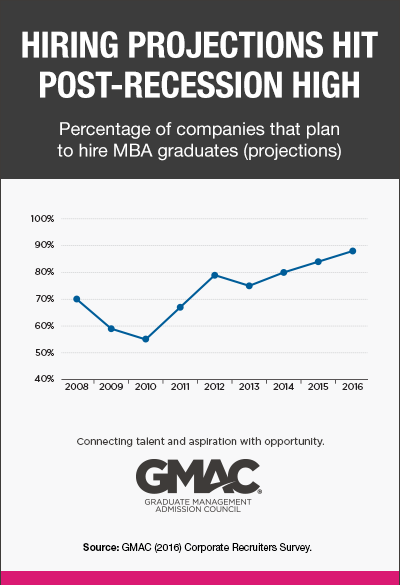MBA Hiring Projections Hit Post-Recession High

Recent business school graduates are being welcomed by one of the best hiring markets in recent memory.
Recent business school graduates are being welcomed by one of the best hiring markets in recent memory, according to the results of GMAC’s 2016 Corporate Recruiters Survey. The survey, which sampled more than 530 companies around the world that recruit directly from participating business schools, found that 88 percent of employers plan to hire recent MBA graduates this year. This figure is up eight percentage points over employer hiring projections made in 2014, when this year’s full-time two-year MBA graduates started b-school, and 33 percentage points from 2010, the lowest point of the Great Recession, when 55 percent of employers were seeking MBA talent.
The value of on-campus recruiting
All-new analysis in this year’s report highlights the value business schools provide to students in connecting them with employers. For the first time, this year’s Corporate Recruiters Survey Report included a supplemental analysis of a general population employer survey of nearly 1,300 employers located in China, France, Germany, India, the United Kingdom, and the United States. The results show overall that half of the companies responding to the supplemental survey have plans to hire an MBA in 2016—ranging from 35 percent of companies in Germany to 70 percent of companies in China.
The difference between the hiring projections in the two surveys underscores the advantage business school graduates have in the hiring market. Being an MBA student on a business school campus means that 9 out of 10 companies that work with your career services office plan to hire candidates just like you in 2016. This critical connection business school career services offices provide between students and company recruiters contributes greatly to the stellar employment outcomes graduates report. Alumni from the full-time two-year MBA Class of 2015, for example, reported an employment rate of 91 percent,[1] spread across jobs in a diverse array of industries.

Industry variation in non-MBA business master’s hiring
Overall, employer demand for Master of Accounting, Master of Finance, and Master in Management graduates is on par with last year. Globally, 44 percent of employers that work directly with business schools plan on hiring Master in Management graduates in 2016, and 40 percent plan to hire Master of Accounting and Master of Finance graduates, respectively.
Within some industries, demand for these graduates has jumped in the last year. The share of employers with plans to hire Master in Management graduates in 2016 is up for employers in the health care/pharmaceuticals (61% of employers) and products/services industries (53%). These two industries also have increased demand for Master of Accounting graduates in 2016—39 percent of health care/pharmaceutical employers and 47 percent of products/services employers plan to hire them in 2016. Recent Master of Finance graduates will be in increased demand, notably in the consulting (36%) and products/services (45%) sectors.
Asked for the first time about their hiring plans for graduates of other non-MBA business master’s programs, about a quarter or more of corporate recruiters report plans to hire graduates from Master of Supply Chain Management (27% of respondents), Master of Data Analytics (26%), and Master of Marketing (24%) programs. Among these graduates, there is considerable variation in demand across industries. Master’s degree-holders from supply chain management programs are in greatest demand among companies in the manufacturing, technology, and products and services sectors; whereas graduates of master’s-level programs in data analytics are in greatest demand in the technology sector, sought by 43 percent of companies — nearly twice as many companies as in other industries.
Starting salaries are trending upward
Globally, more than half (54%) of employers plan to increase MBA starting salaries either at the rate of inflation (33% of respondents) or above (21%); 46 percent will keep starting MBA salaries the same as 2015.
These MBA salary projections for 2016 are similar to those projected for new hires with non-MBA business master’s degrees, with one exception: 67 percent of companies that plan to hire graduates with Master in Supply Chain Management degrees expect to increase their starting salaries either at the rate of inflation (46%) or higher (20%).
Internship opportunities for MBAs abundant across most industries
Overall, more than 3 in 4 employers responding to this year’s survey reported that they will offer internships to graduate-level business students in 2016—67 percent to MBA candidates, and 23 percent to non-MBA business master’s candidates. Internship opportunities for MBA students are particularly prevalent in the health care/pharmaceuticals (84% of employers offering), technology (76%), and manufacturing (75%) industries. If you’ll be starting an MBA program this fall, now is a good time to begin exploring internship opportunities with your career services office.
Begin your journey to an MBA or non-MBA business master’s degree by exploring what business schools have to offer. Start your search by using the Program Finder.
[1] GMAC (2015) B-School Follow-Up: Class of 2015.



